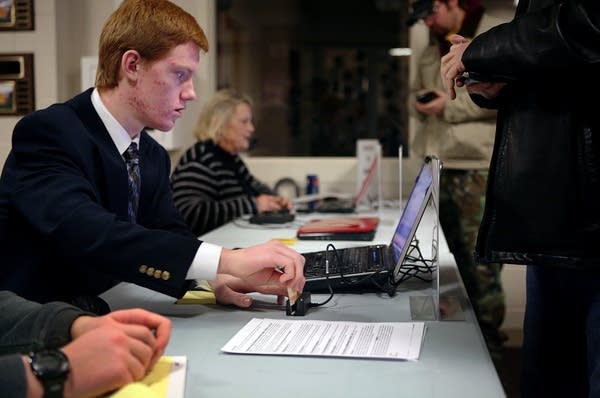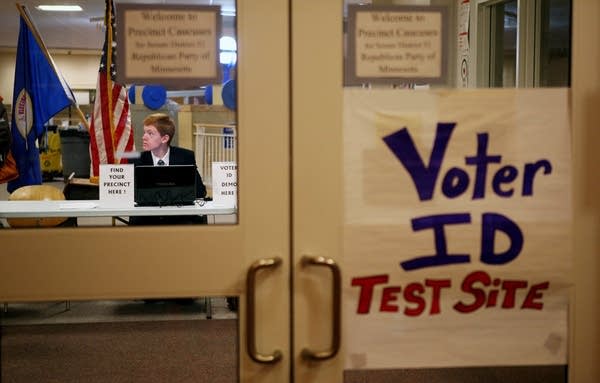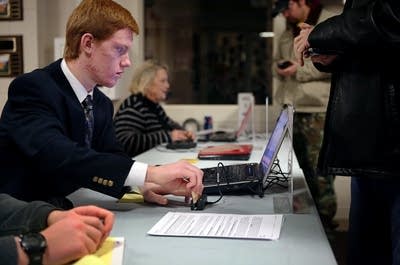Would voter ID amendment really prevent voter fraud?
Go Deeper.
Create an account or log in to save stories.
Like this?
Thanks for liking this story! We have added it to a list of your favorite stories.

Public opinion polls have consistently shown strong support for a proposed constitutional amendment that would require Minnesotans show photo identification in to vote.
Supporters of the voter ID amendment claim the requirement is needed to protect the integrity of the state's election system, which they contend is too loose and open to fraud.
But several studies have found the kind of voter fraud the ID requirement is designed to prevent extremely rare.
Last month, the Carnegie-Knight Initiative on the Future of Journalism Education project called "News21" released an analysis of more than 2,000 alleged election-fraud cases nationwide over the past 12 years. It concluded that while fraud has occurred, the rate is "infinitesimal," and in-person voter impersonation is "virtually non-existent."
Turn Up Your Support
MPR News helps you turn down the noise and build shared understanding. Turn up your support for this public resource and keep trusted journalism accessible to all.
Such arguments don't sway voters like Rollie Nissen, of Willmar, Minn. Nissen, who attended a recent campaign event in St. Paul, described voter ID as common sense.
"If there weren't cheating going on, we wouldn't need highway patrolmen, game wardens, referees at athletics events," Nissen said. "All of those things require somebody looking over your shoulder. So, why wouldn't you take a close look at who's voting?"
The pro-amendment group Minnesota Majority has been beating the drum on voter fraud for several years. Its leaders have dug through voting records, flagged irregularities and pushed county attorneys for investigations.

Executive Director Dan McGrath, who is also running the pro-amendment campaign Protect My Vote, contends that those efforts resulted in Minnesota topping all states in the number of voter fraud convictions linked to a single election. McGrath said nearly 200 convictions were from 2008, when Democrat Al Franken defeated Republican Norm Coleman in the U.S. Senate race by a razor-thin margin in a recount.
"We know from our research that 1,099 ineligible felons voted in that election," McGrath said. "That's three-times the margin of victory, so fraud played a role. Now, it may have impacted the way the election went. I don't know. We can't know that, and that leads to problems, when someone is sitting in office as a representative of the people, and we don't know whether we actually elected them or not."
McGrath suspects there are other kinds of fraud, such as voter impersonation, going on in Minnesota. But he concedes that those crimes are difficult to root out.
Voter ID opponents say the amendment wouldn't do anything to solve the problem McGrath has identified. Chuck Samuelson, executive director of the American Civil Liberties Union of Minnesota, said the proposed requirement will not stop felons who are still on probation from voting, because they could easily possess a valid identification. Samuelson also contends that people trying to vote using someone else's name simply isn't happening.
"The issue of voter impersonation just doesn't exist. It doesn't exist anywhere," Samuelson said. "Anyone who says otherwise is either ignorant or knowingly spreading falsehoods."
Other opponents agree. Laura Fredrick Wang, executive director of the League of Women Voters Minnesota, said she thinks the amendment is more likely to disenfranchise voters than prevent voter fraud.
"We heard Norm Coleman's attorney from the recount back in 2008 say that they looked for fraud, [and] they didn't find it," Wang said. "I think the number of people who are going to find it difficult, if not impossible, to get their ballot counted is going too far, far outweigh the one or two votes that get counted in any given election that maybe shouldn't have been."

Despite the recent studies that conclude voter fraud is rare, amendment supporters insist a change in voting procedures is needed. Peter Nelson, director of public policy at the Center of the American Experiment, a conservative think tank, said any fraud is too much.
"We don't believe that there is a lot of fraud in the system," Nelson said. "But we believe that even a small amount of fraud justifies doing this. Because even a small amount of fraud can make the difference in an election."
Nelson said he believes voter ID will improve public confidence in elections, which would then improve confidence in government.




